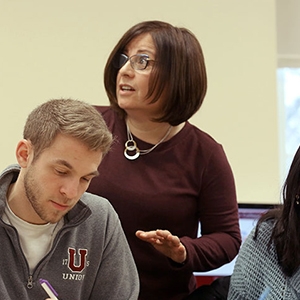Students in Prof. Maritza Osuna’s capstone course, SPN 405 (Lost) and Found in Translation, know well the word for “rewarding”: gratificante.
This winter term, they took on a project that not only explores the complexities of translation but helps a Schenectady domestic violence shelter trying to extend its reach to the local Spanish-speaking population.
“To learn about a concept from a textbook is one thing,” said Drew Lenz ’19, “but to tackle this concept firsthand with a project that has immediate, real-world implications is both challenging and rewarding.”
Osuna developed this year’s syllabus after focusing her last class on translating works by Puerto Rican playwright Carlos Canales. “I thought, this year let’s do something to impact our local community,” she said.
She connected with the Schenectady YWCA and arranged for her students to take on the task of translating the shelter’s eight pages of rules and regulations.
One of their first lessons: there is no such thing as “word-for-word.” Bridging the divide between Spanish and English requires not just fluency, but an understanding of cultural nuance, Osuna said.
For example, if a client is to be “expelled” from the program for breaking the rules, does the Spanish translation convey the permanence of expulsion?
The passive voice in English has to become active in Spanish to convey a more linguistically and culturally accurate meaning, Osuna said. So, the English phrase, “we are here to help” must be: “we want to help you.”
Katie Tighe ’18 finds the work both challenging and humbling.“ One of the recurring issues is trying to translate across cultures,” she said. “To what extent do you stay as close to the original as possible versus taking some liberties to have the translation make more sense? It is a constant balancing act that often requires us to make linguistic disclaimers in the translations.”
Like most of his classmates, Sam Fogarty ’20 thought the class would be a mundane routine of swapping one word for another. “However, this was not the case,” he said. “I've learned an immense amount about culture, gender, language and communication.”
The class has advanced Fogarty’s interest in advocating for Spanish-speaking LGBTQ people and women. Last winter, he volunteered with True Colors Inc., a Hartford-based organization serving sexual and gender minority youth. He plans to do translations for the organization this spring.
Tiffany George ’18 calls it the “most hands-on class” she has taken at Union. “I feel that we live in a society dedicated to finding out one answer that solves something,” she said. “In the world of translation, there are multiple interpretations, perspectives, and opinions on how a single line should be translated."
Giovana Vivaldi Coelho ’18 speaks to gratificante. “It is a class that rewards you every step you take in the learning process, because it gives back to students in the form of practice while it also directly benefits those in the community who are in need.”
Kim Siciliano, executive director of the YWCA said, “We are very grateful to Professor Osuna for choosing us to be the organization for which her class translates documents. Victims of domestic violence and homelessness already have many barriers to getting the services they need. Through the work of Professor Osuna’s class, we will be able to erase the language barrier with our Latina population and bring awareness about our programs and services to a population who needs us, but might not know about us.”


